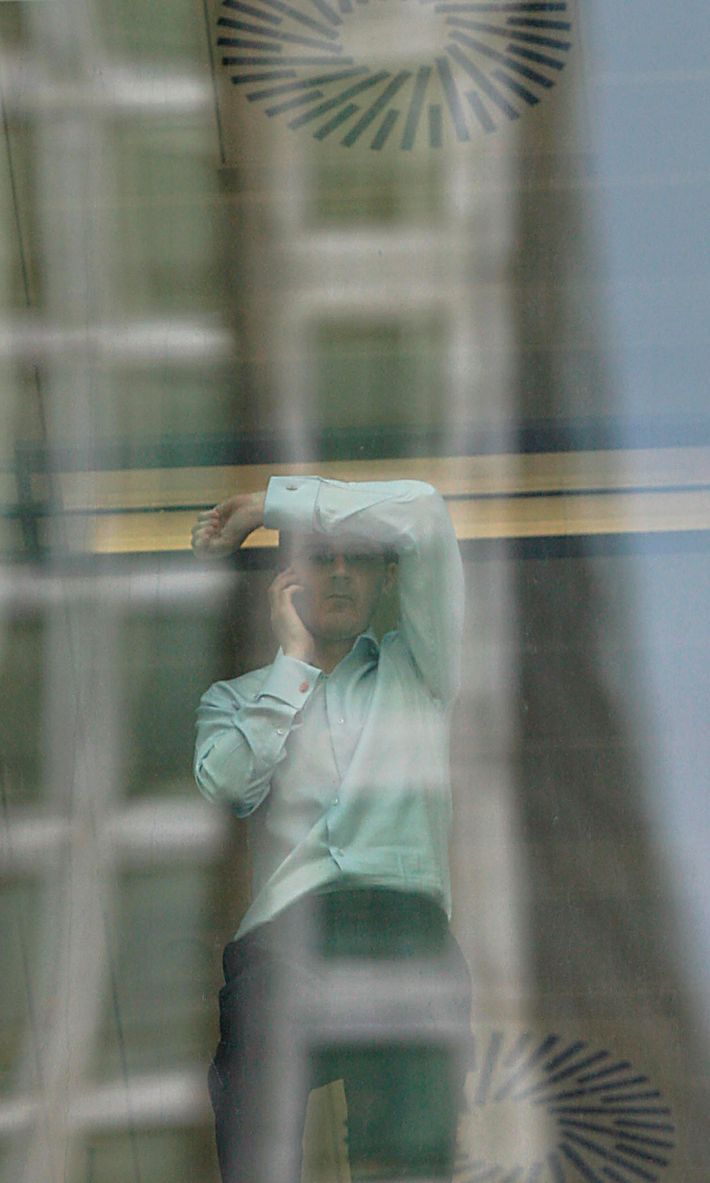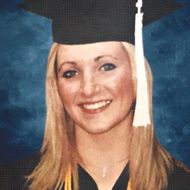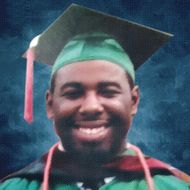LONG READ! But worth it
You are using an out of date browser. It may not display this or other websites correctly.
You should upgrade or use an alternative browser.
You should upgrade or use an alternative browser.
A decade after the 2008 financial crisis: The lingering effects
- Thread starter FAH1223
- Start date
More options
Who Replied?Ya' Cousin Cleon
OG COUCH CORNER HUSTLA
That next one is gonna be a motherfukker 



In the story...That next one is gonna be a motherfukker

MILLENNIALS BECAME SOCIALISTS
By Malcolm Harris
A Lehman Brothers office, September 15, 2008. Photo: Ben Stansall/AFP/Getty Images
When Lehman Brothers failed on September 15, 2008, I was a sophomore at the University of Maryland, and my fellow undergrads and I were petrified. What did this mean — would we ever be able to find jobs?
It was the golden age of blogs, and my roommate and I cobbled together what happened by combing the web for experts we could trust and links to data about the derivatives market. Until this point, my politics could’ve been described as “social democrat.” I’d been an activist since I joined the antiwar movement as a kid, outraged at the American invasion of Afghanistan. A lot of my friends were radicals, but I took pride in being the reasonable one, and I assumed I’d end up in the Democratic Party fold. I spent my first winter break at college going door-to-door in Iowa for the John Edwards presidential campaign. (He was the labor candidate, if you recall.) I’d been willing to compromise a lot to stay on the blue team, but I was torn about the bailout vote: I saw less and less worth saving in the status quo.
When the first bailout vote failed on September 29 and the market dropped, I realized that was what I wanted. When the next vote succeeded, I no longer saw opposition parties, just two performers putting on a show. I hadn’t been reasonable after all; I’d been a sucker. I joined the “occupationist” strand of the student movement, and soon a bunch of us anarcho-communists set our sights on a park in lower Manhattan.
I voted for Hillary (in Pennsylvania!), but Democratic politics have never recovered in my eyes. If democracy under capitalism is but a stage play meant to justify rule by the rich, then ten years ago September I stopped suspending disbelief.
Ya' Cousin Cleon
OG COUCH CORNER HUSTLA
In the story...
MILLENNIALS BECAME SOCIALISTS
By Malcolm Harris

A Lehman Brothers office, September 15, 2008. Photo: Ben Stansall/AFP/Getty Images
When Lehman Brothers failed on September 15, 2008, I was a sophomore at the University of Maryland, and my fellow undergrads and I were petrified. What did this mean — would we ever be able to find jobs?
It was the golden age of blogs, and my roommate and I cobbled together what happened by combing the web for experts we could trust and links to data about the derivatives market. Until this point, my politics could’ve been described as “social democrat.” I’d been an activist since I joined the antiwar movement as a kid, outraged at the American invasion of Afghanistan. A lot of my friends were radicals, but I took pride in being the reasonable one, and I assumed I’d end up in the Democratic Party fold. I spent my first winter break at college going door-to-door in Iowa for the John Edwards presidential campaign. (He was the labor candidate, if you recall.) I’d been willing to compromise a lot to stay on the blue team, but I was torn about the bailout vote: I saw less and less worth saving in the status quo.
When the first bailout vote failed on September 29 and the market dropped, I realized that was what I wanted. When the next vote succeeded, I no longer saw opposition parties, just two performers putting on a show. I hadn’t been reasonable after all; I’d been a sucker. I joined the “occupationist” strand of the student movement, and soon a bunch of us anarcho-communists set our sights on a park in lower Manhattan.
I voted for Hillary (in Pennsylvania!), but Democratic politics have never recovered in my eyes. If democracy under capitalism is but a stage play meant to justify rule by the rich, then ten years ago September I stopped suspending disbelief.
the next couple years is gonna be dependent on mutual aid and squatters rights imo
 in fact I should get doing a little campaigning about just that.
in fact I should get doing a little campaigning about just that.Entropy Fan
Superstar
That next one is gonna be a motherfukker
I'm stacking up to take advantage of it

Ya' Cousin Cleon
OG COUCH CORNER HUSTLA
 Make that money off the many people soon to be cribbing up in they cars
Make that money off the many people soon to be cribbing up in they cars I'm stacking up to take advantage of it

EUROPEANS BECAME POPULISTS
By Sarah Leonard
In Capital, Thomas Piketty gave empirical backing to people’s intuitions: The 2008 financial crisis made it clear that elites were putting one over on us, and the creeping recovery hadn’t solved the inequality crisis. In Europe, many countries were trying to solve the crisis through austerity — radical budget cuts that hurt the victims of the crisis even more. The Lancet found that suicides and disease rose as health budgets were slashed. For poorer countries in the EU, faraway structures like the European Central Bank dictated what national governments could spend. Economies and democracy were in joint, precipitous decline.
Centrist parties imposed unpopular austerity programs and slid in the polls, creating an opening for the rise of Trump-style extreme-right nativists with their own racist tweets and creative coiffure. The specimens on Europe’s extreme right have been no less grotesque than on ours. In the Netherlands, Geert Wilders, the head of the resurgent right-wing Party for Freedom, tweets about becoming “retarded Islamic sharia-nations.” In France, Marine Le Pen has transformed her father’s fascist National Front party into a major electoral contender. (Her father Jean-Marie was famous for his Holocaust denials.) In Germany, the Alternative for Germany party, which advocates banning mosques, is now the largest opposition party in parliament.
Meanwhile, the centrist parties that remain cater to the right in order to hold on to power. The Brexit referendum was originally a concession from the Conservative Party to prevent defections to the far-right UK Independence Party. Indeed, the far right has been held at bay only in countries where the left embraced the populist moment, too.
By Sarah Leonard
In Capital, Thomas Piketty gave empirical backing to people’s intuitions: The 2008 financial crisis made it clear that elites were putting one over on us, and the creeping recovery hadn’t solved the inequality crisis. In Europe, many countries were trying to solve the crisis through austerity — radical budget cuts that hurt the victims of the crisis even more. The Lancet found that suicides and disease rose as health budgets were slashed. For poorer countries in the EU, faraway structures like the European Central Bank dictated what national governments could spend. Economies and democracy were in joint, precipitous decline.
Centrist parties imposed unpopular austerity programs and slid in the polls, creating an opening for the rise of Trump-style extreme-right nativists with their own racist tweets and creative coiffure. The specimens on Europe’s extreme right have been no less grotesque than on ours. In the Netherlands, Geert Wilders, the head of the resurgent right-wing Party for Freedom, tweets about becoming “retarded Islamic sharia-nations.” In France, Marine Le Pen has transformed her father’s fascist National Front party into a major electoral contender. (Her father Jean-Marie was famous for his Holocaust denials.) In Germany, the Alternative for Germany party, which advocates banning mosques, is now the largest opposition party in parliament.
Meanwhile, the centrist parties that remain cater to the right in order to hold on to power. The Brexit referendum was originally a concession from the Conservative Party to prevent defections to the far-right UK Independence Party. Indeed, the far right has been held at bay only in countries where the left embraced the populist moment, too.
Ya' Cousin Cleon
OG COUCH CORNER HUSTLA
EUROPEANS BECAME POPULISTS
By Sarah Leonard
In Capital, Thomas Piketty gave empirical backing to people’s intuitions: The 2008 financial crisis made it clear that elites were putting one over on us, and the creeping recovery hadn’t solved the inequality crisis. In Europe, many countries were trying to solve the crisis through austerity — radical budget cuts that hurt the victims of the crisis even more. The Lancet found that suicides and disease rose as health budgets were slashed. For poorer countries in the EU, faraway structures like the European Central Bank dictated what national governments could spend. Economies and democracy were in joint, precipitous decline.
Centrist parties imposed unpopular austerity programs and slid in the polls, creating an opening for the rise of Trump-style extreme-right nativists with their own racist tweets and creative coiffure. The specimens on Europe’s extreme right have been no less grotesque than on ours. In the Netherlands, Geert Wilders, the head of the resurgent right-wing Party for Freedom, tweets about becoming “retarded Islamic sharia-nations.” In France, Marine Le Pen has transformed her father’s fascist National Front party into a major electoral contender. (Her father Jean-Marie was famous for his Holocaust denials.) In Germany, the Alternative for Germany party, which advocates banning mosques, is now the largest opposition party in parliament.
Meanwhile, the centrist parties that remain cater to the right in order to hold on to power. The Brexit referendum was originally a concession from the Conservative Party to prevent defections to the far-right UK Independence Party. Indeed, the far right has been held at bay only in countries where the left embraced the populist moment, too.
 and Centrists wonder why they’re not respected.
and Centrists wonder why they’re not respected.Entropy Fan
Superstar
Make that money off the many people soon to be cribbing up in they cars
Or let someone else make it?
THERE WERE NO JOBS FOR THE CLASS OF ’08

Krystle Champagne-Norwood
Howard University / B.A., Radio, Television, and Film
“I was taking any kind of gig I could get so that I could stay in the industry and feel like my degree wasn’t a waste. My husband and I talk about how we know what it’s like to be broke, and we don’t want to go back that way. You could feel the desperation at the time.”

Josh Troutman
Liberty University / B.S., business with a finance specialization
“When I was in college, I wanted to do investment banking. I worked really hard but couldn’t quite get there, so I went to B-school in part to ‘catch up’ to where I’d be had I not dealt with the recession. If the recession never really happened, where would I actually be?”

Jocelyn Galloway
UCSD / B.S., molecular biology; B.A., economics
“I ended up going to law school. I think I’ve found a career path that I’m passionate about. That being said, it did come at a cost: A good portion of my paycheck goes toward paying student loans, and it’ll be like that for quite some time.”

Kelly Howard
Iowa State / B.A., Journalism and Mass Communications
“After I graduated I was working at a local grocery store during the week. People I went to school with, they would come through and be in my line, and they would be like, ‘Didn’t you graduate?’ It was a very humbling time in my life.”

Jordon Derr
Florida A&M / B.S., graphic design
“I had an internship. After it ended, I went around looking for work. But people who had the experience were dropping their rates. They were charging the same amount that I was, fresh out of school, but with more experience. We were, like, cannibalizing ourselves.”
As told to Rachel Bashein
Krystle Champagne-Norwood
Howard University / B.A., Radio, Television, and Film
“I was taking any kind of gig I could get so that I could stay in the industry and feel like my degree wasn’t a waste. My husband and I talk about how we know what it’s like to be broke, and we don’t want to go back that way. You could feel the desperation at the time.”
Josh Troutman
Liberty University / B.S., business with a finance specialization
“When I was in college, I wanted to do investment banking. I worked really hard but couldn’t quite get there, so I went to B-school in part to ‘catch up’ to where I’d be had I not dealt with the recession. If the recession never really happened, where would I actually be?”
Jocelyn Galloway
UCSD / B.S., molecular biology; B.A., economics
“I ended up going to law school. I think I’ve found a career path that I’m passionate about. That being said, it did come at a cost: A good portion of my paycheck goes toward paying student loans, and it’ll be like that for quite some time.”
Kelly Howard
Iowa State / B.A., Journalism and Mass Communications
“After I graduated I was working at a local grocery store during the week. People I went to school with, they would come through and be in my line, and they would be like, ‘Didn’t you graduate?’ It was a very humbling time in my life.”
Jordon Derr
Florida A&M / B.S., graphic design
“I had an internship. After it ended, I went around looking for work. But people who had the experience were dropping their rates. They were charging the same amount that I was, fresh out of school, but with more experience. We were, like, cannibalizing ourselves.”
As told to Rachel Bashein
THERE WERE NO JOBS FOR THE CLASS OF ’08

Krystle Champagne-Norwood
Howard University / B.A., Radio, Television, and Film
“I was taking any kind of gig I could get so that I could stay in the industry and feel like my degree wasn’t a waste. My husband and I talk about how we know what it’s like to be broke, and we don’t want to go back that way. You could feel the desperation at the time.”

Josh Troutman
Liberty University / B.S., business with a finance specialization
“When I was in college, I wanted to do investment banking. I worked really hard but couldn’t quite get there, so I went to B-school in part to ‘catch up’ to where I’d be had I not dealt with the recession. If the recession never really happened, where would I actually be?”

Jocelyn Galloway
UCSD / B.S., molecular biology; B.A., economics
“I ended up going to law school. I think I’ve found a career path that I’m passionate about. That being said, it did come at a cost: A good portion of my paycheck goes toward paying student loans, and it’ll be like that for quite some time.”

Kelly Howard
Iowa State / B.A., Journalism and Mass Communications
“After I graduated I was working at a local grocery store during the week. People I went to school with, they would come through and be in my line, and they would be like, ‘Didn’t you graduate?’ It was a very humbling time in my life.”

Jordon Derr
Florida A&M / B.S., graphic design
“I had an internship. After it ended, I went around looking for work. But people who had the experience were dropping their rates. They were charging the same amount that I was, fresh out of school, but with more experience. We were, like, cannibalizing ourselves.”
As told to Rachel Bashein
These stories are why I would like to believe that Wall St. learned it's lesson. If not, then I'd like to believe that the American people (not hick Trump supporters from Dothan, Alabama) will not allow the country to fall into such an economic crisis like that again.
Domingo Halliburton
Handmade in USA
At the end of the day, it would have been 1929 again. Obama bailed the people out who could pay it back.
THERE WERE NO JOBS FOR THE CLASS OF ’08

Krystle Champagne-Norwood
Howard University / B.A., Radio, Television, and Film
“I was taking any kind of gig I could get so that I could stay in the industry and feel like my degree wasn’t a waste. My husband and I talk about how we know what it’s like to be broke, and we don’t want to go back that way. You could feel the desperation at the time.”

Josh Troutman
Liberty University / B.S., business with a finance specialization
“When I was in college, I wanted to do investment banking. I worked really hard but couldn’t quite get there, so I went to B-school in part to ‘catch up’ to where I’d be had I not dealt with the recession. If the recession never really happened, where would I actually be?”

Jocelyn Galloway
UCSD / B.S., molecular biology; B.A., economics
“I ended up going to law school. I think I’ve found a career path that I’m passionate about. That being said, it did come at a cost: A good portion of my paycheck goes toward paying student loans, and it’ll be like that for quite some time.”

Kelly Howard
Iowa State / B.A., Journalism and Mass Communications
“After I graduated I was working at a local grocery store during the week. People I went to school with, they would come through and be in my line, and they would be like, ‘Didn’t you graduate?’ It was a very humbling time in my life.”

Jordon Derr
Florida A&M / B.S., graphic design
“I had an internship. After it ended, I went around looking for work. But people who had the experience were dropping their rates. They were charging the same amount that I was, fresh out of school, but with more experience. We were, like, cannibalizing ourselves.”
As told to Rachel Bashein
Yep, shyt was no joke. I graduated in 2010 and half of the folks I was interviewing with were 08' and 09' grads that couldn't find anything.
These stories are why I would like to believe that Wall St. learned it's lesson. If not, then I'd like to believe that the American people (not hick Trump supporters from Dothan, Alabama) will not allow the country to fall into such an economic crisis like that again.
Lol. We're in 3 bubbles and one of them is the same housing crisis from 2008

At the end of the day, it would have been 1929 again. Obama bailed the people out who could pay it back.
WTF HAPPENED?
Photo: Bloomberg/Bloomberg via Getty Images
Sheila Bair
Former head of FDIC
Once the system was stabilized in early 2009, we had an opportunity to restructure and break up Citigroup in particular, but we didn’t do that. I think that was a missed opportunity. We just reinforced too-big-to-fail with all these bailouts, let’s face it. Other than Lehman Brothers, nobody took their medicine. Restructuring Citigroup would have sent a powerful signal that the government had the gumption and courage to stand up to these very large institutions, and to impose losses on bond holders.
I think we’ve improved the system on the margin. There are higher capital requirements, there’s better bank liquidity, less reliance on short-term financing, less reliance on debt among the regulated banks. Those are all positive things. But the financial system we have is still basically the financial system we had in 2008, with more capital and less reliance on short-term funding, so whether it’s enough? I hope it is.
I wish we had more Republicans who would stand up to these cronies who want the government bailouts. I think a lot of people still want that on Wall Street — it’s secretly what they want. They think it’s the government’s obligation to keep them afloat. I’m a capitalist, and I’d rather have the state own them than have that system.
It’s very frustrating. It’s just stupid economics. Set the morality aside; it’s just dumb economics to have a system like this where you’re propping up inefficient, bloated institutions. So there are good economic reasons to not have the system we had in 2008, and whether we’ve gotten rid of it or not I don’t know. I think we won’t know until a big bank gets in trouble again. Then we’ll see what happens. I don’t even want to think about what the political fallout would be.
Yves Smith
Founder, naked capitalism
Trump is crowing about this 4.1 percent GDP growth, right? Yet if you look at the statistics, real worker wages have continued to be flat for this period. The crisis itself was the greatest looting of the public purse in history. The crisis itself was a huge wealth transfer. The Obama administration should have forced a lot more recognition of the losses. These losses were real. They should have forced more loan write-downs. And recognition of the loss to the financial system. And they should have had a huge stimulus to offset the downdraft of recognizing those losses. And in fact the Japanese, early in their crisis, they said the biggest mistake we made was not writing down the bad loans in the banking system. Don’t repeat our mistake.
And we did this in a more indirect manner by having the Fed engineer these super-low interest rates that were a transfer from savers to the financial system. Economist Ed Kane said that basically savers lost $300 billion in income a year. So that reduction of income right there, you see today. There’s a Wall Street Journalstory about how pension funds are in crisis. There’s not a single mention of the fact that the zero-interest-rate policies are the reason why the pensions are in distress. All retirees and long-term savers, life insurance, they’re all in the same boat. It used to be that if you were a saver or an asset holder, you could get a decent positive return doing something not crazy. And the Fed took that away. The big reason the pensions are in crisis is because the way we dealt with the crisis.
We have this fallacy that normal people should be able to save for retirement. If public pension funds, which can invest at the very lowest possible fees, can’t make this work, how is Joe Mom-and-Pop America gonna be able to do this? Again, it’s back to the stagnant worker wages. So, great, we’re not paying people enough, housing prices are very inflated. We’ve got this horrible medical system that costs way too much, and how are people supposed to put any money aside when their real estate and their rents and their health costs are going up?
Why do you think we have Trump? I mean, even though he did a big bait-and-switch, as we all know, there were a lot of people that lost their homes, their community wasn’t what it used to be, particularly if they lived in the Rust Belt. And then you have these people on the coast saying, “Oh, they should go get training. It’s disgusting.” I mean, let them eat cake is let them get training. What you hear from these coastal elites: People over 40, even over 35, are basically non-hirable. Are you gonna train them? They’re gonna waste their time thinking they can get a new job? I mean, that’s just lunacy.
I think the Republicans, because they’re sort of loud and proud, that’s the way they behave, it’s easier to point fingers at them. And in some sense they are more vocal proponents of bad ideology, but there’s this great tendency in politics and in business to present whatever was done as being terrific and successful when it wasn’t. This is one of my criticisms of the Obama administration, but now appears to be true of the Democratic Party generally, that they think the solution for every problem is better PR.